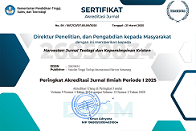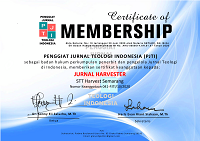Model Pemuridan Paulus kepada Titus serta Implikasinya bagi Pemberdayaan Jemaat dalam Pelayanan Gereja
Abstract
Discipleship is a critical element in shaping spiritual character and leadership within the church. However, implementing effective discipleship models remains a challenge in many local churches. The Apostle Paul, through his mentoring relationship with Titus, presents a comprehensive and contextual example of discipleship. This study employs a qualitative method using a systematic literature review approach. Data sources include the Bible, classical and contemporary theological works, and relevant academic articles. Thematic analysis is applied to identify key elements in Paul’s discipleship model as reflected in his epistle to Titus. The findings show that Paul’s discipleship model incorporates personal relationships, sound doctrinal teaching, practical ministry equipping, exemplary living, training to face challenges, and the principle of multiplication. This process not only develops disciples but also produces leaders who can sustain and expand the ministry. Paul’s discipleship model with Titus serves as an ideal framework for modern churches seeking to empower their congregations. Discipleship is not merely a transfer of knowledge but a transformative process that nurtures faith and equips believers for active and responsible ministry involvement.
Abstrak
Pemuridan merupakan elemen penting dalam pembentukan karakter rohani dan kepemimpinan dalam gereja. Namun, penerapan model pemuridan yang efektif masih menjadi tantangan di banyak gereja lokal. Paulus, melalui relasinya dengan Titus, memberikan teladan pemuridan yang menyeluruh dan kontekstual. Penelitian ini menggunakan metode sistematic literature review, pendekatan studi pustaka. Sumber data meliputi Alkitab, literatur teologis klasik dan kontemporer, serta artikel akademik yang relevan. Analisis dilakukan secara tematik terhadap elemen-elemen pemuridan Paulus yang dituliskan dalam suratnya kepada Titus. Ditemukan bahwa model pemuridan Paulus mencakup aspek relasi personal, pengajaran yang sehat, pembekalan untuk pelayanan, keteladanan hidup, pelatihan menghadapi tantangan, dan prinsip multiplikasi. Proses pemuridan tidak hanya membentuk murid, tetapi juga menghasilkan pemimpin yang mampu melanjutkan pelayanan. Model pemuridan Paulus kepada Titus menjadi pola ideal yang dapat diadaptasi gereja masa kini untuk memberdayakan jemaat secara efektif. Pemuridan tidak hanya menumbuhkan iman, tetapi juga memperlengkapi jemaat untuk terlibat aktif dan bertanggung jawab dalam pelayanan.
Full Text:
PDFReferences
Brueggemann, Walter A. “The Bible and Mission: Some Interdisciplinary Implications for Teaching.” Missiology: An International Review 10, no. 4 (October 1, 1982): 397–412. https://doi.org/10.1177/009182968201000402.
Christensen, Sean. “The Pursuit of Self-Control: Titus 2:1–14 and Accommodation to Christ.” Journal for the Study of Paul and His Letters 6, no. 2 (October 1, 2016): 161–80. https://doi.org/10.2307/26371745.
Coffey, David. “The ‘Incarnation’ of the Holy Spirit in Christ.” Theological Studies 45, no. 3 (September 1, 1984): 466–80. https://doi.org/10.1177/004056398404500303.
Francis, Leslie J., Bruce G. Fawcett, Tracy Freeze, Renee Embree, and David W. Lankshear. “What Helps Young Christians Grow in Discipleship? Exploring Connections between Discipleship Pathways and Psychological Type.” Mental Health, Religion & Culture 24, no. 6 (July 3, 2021): 563–80. https://doi.org/10.1080/13674676.2020.1767556.
Galindo, Israel. “Methods of Christian Education toward Christian Spiritual Formation.” Review & Expositor 98, no. 3 (August 1, 2001): 411–29. https://doi.org/10.1177/003463730109800307.
Josue Huaycani Cotrado, Yiner. “Principles of Discipleship and Church Growth from Acts 2:46‐47.” International Review of Mission 109, no. 2 (November 27, 2020): 328–39. https://doi.org/10.1111/irom.12337.
Pranoto, Minggus Minarto, Rabono Rabono, and Hudiman Waruwu. “Teologi Kristen Menghadapi Tantangan Zaman (Spiritualitas, Usaha Berteologi, Dan Praksis Dalam Konteks Sinode GIA).” Jurnal Abdiel: Khazanah Pemikiran Teologi, Pendidikan Agama Kristen Dan Musik Gereja 7, no. 1 (April 30, 2023): 75–91. https://doi.org/10.37368/ja.v7i1.530.
Sitepu, Nathanail. “RELASI INTELEKTUALITAS DAN SPIRITUALITAS DALAM BERAPOLOGETIKA: SUATU TINJAUAN INJILI.” VOX DEI: Jurnal Teologi Dan Pastoral 1, no. 2 (December 27, 2020): 118–30. https://doi.org/10.46408/vxd.v1i2.36.
———. “Urgensi Menemukan Model Pemuridan Sesuai Tipe Spiritualitas Jemaat.” HARVESTER: Jurnal Teologi Dan Kepemimpinan Kristen 5, no. 2 (2020): 105–19. https://doi.org/10.52104/harvester.v5i2.44.
Stevanus, Kalis, and Nathanail Sitepu. “Strategi Pendidikan Kristen Dalam Pembentukan Warga Gereja Yang Unggul Dan Berkarakter Berdasarkan Perspektif Kristiani.” SANCTUM DOMINE: JURNAL TEOLOGI 10, no. 1 (December 29, 2020): 49–66. https://doi.org/10.46495/sdjt.v10i1.84.
Suhartono, Entot. “Systematic Literatur Review ( SLR ): Metode , Manfaat , Dan Tantangan Learning Analytics Dengan Metode Data Mining Di Dunia Pendidikan Tinggi.” Jurnal Ilmiah INFOKAM 13, no. 1 (2017): 73–86. http://amikjtc.com/jurnal/index.php/jurnal/article/view/123.
Tumbel, Daniel. “Tema Utama Teologi Titus.” Journal Kerusso 2, no. 1 (October 22, 2018): 18–33. https://doi.org/10.33856/kerusso.v2i1.36.
DOI: https://doi.org/10.52104/harvester.v10i1.297
Refbacks
- There are currently no refbacks.
This work is licensed under a Creative Commons Attribution-ShareAlike 4.0 International License.
HARVESTER telah terindeks pada situs:
  |   |  |  |  |
|






1.png)
